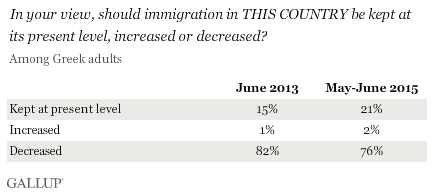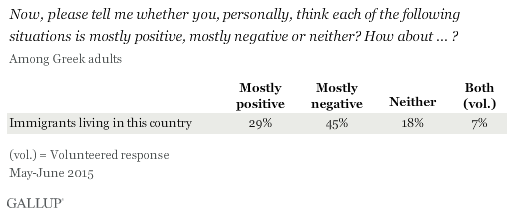Story Highlights
- Three in four (76%) want lower immigration levels
- Majority still see communities as good places for immigrants
WASHINGTON, D.C. -- Greece has been an entry point to Europe for migrants since long before the recent surge of migrants arrived on its shores this year. The majority of Greeks (57%) surveyed in May and June still see their communities as good places for immigrants to live. However, a strong majority (76%) would like to see immigration levels into their country decrease, and many felt this way even before the current migrant crisis.

The more than 350,000 migrants who the International Organization for Migration estimates have journeyed across the Mediterranean to Europe so far this year overshadow the 280,000 who arrived in all of last year. More than 230,000 of the 350,000 have landed in Greece, although most have other final destinations, such as Germany, in mind when they arrive.
The high percentage of Greeks who want to see lower immigration levels and the majority who say immigration as a whole is a bad thing for Greece (63%) at least partly reflect the financial strain Greeks have been under in the past several years. As Greece starts its third economic bailout, the government has said it can't provide for the huge influx of migrants who are arriving daily.
Further, most Greeks are not thinking about immigrants hypothetically when they answer these questions -- the majority of them (80%) personally know immigrants living in Greece. Still, nearly half of Greeks (45%) say that immigrants living in Greece is a mostly negative situation, and less than one-third (29%) say it is a mostly positive situation.

Implications
Greeks' negative attitudes toward immigration highlight the challenges the European Union faces in reconciling the conflicting approaches that its member countries have taken in dealing with the current crisis. Few Greeks could have anticipated that they would be grappling with one of the biggest migrant streams since World War II on top of their economic crisis -- and neither situation looks like it will be resolved in the near term. Some relief could be on the way, however. During an emergency EU session on Monday, EU nations agreed to help countries on the front lines, including Greece, and relocate migrants to other countries.
Survey Methods
Results are based on face-to-face interviews with 1,000 adults, aged 15 and older, conducted May 14-June 16, 2015, in Greece. For results based on the total sample of national adults, the margin of sampling error is 卤3.7 percentage points at the 95% confidence level. All reported margins of sampling error include computed design effects for weighting.
For more complete methodology and specific survey dates, please review .
Learn more about how the works.
